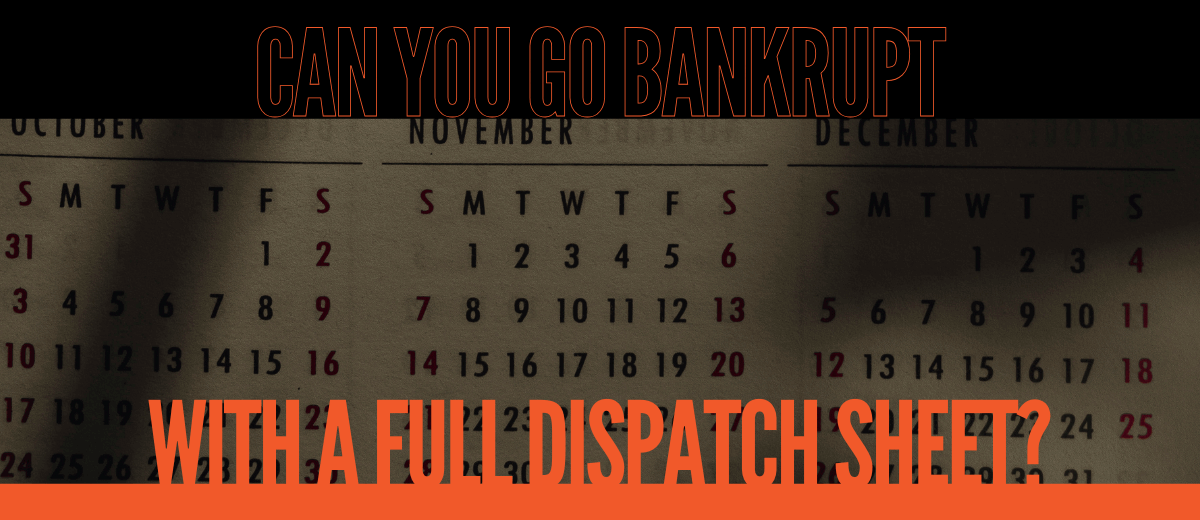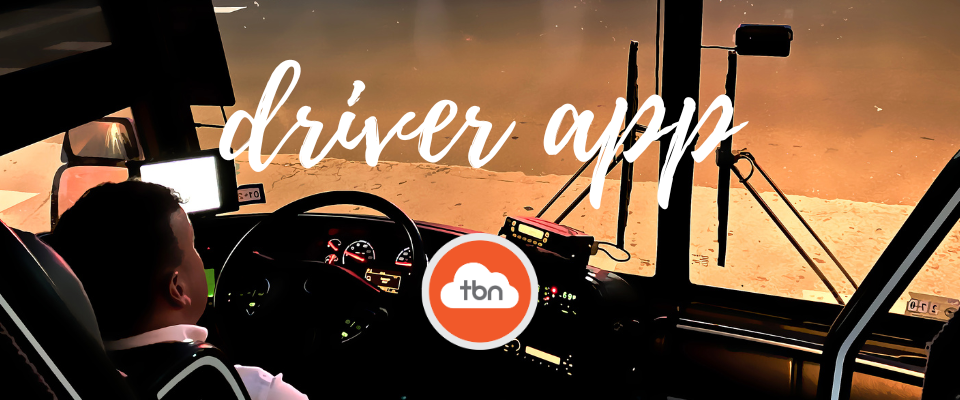
User Portal 2.43 Release Notes
September 29, 2025
Aligning Promise and Delivery with Technology
October 7, 2025Can you go Bankrupt With Full Dispatch Boards?
The art of losing money—and how to avoid it
We’ve all been there: the calendar is slammed, the phones never stop, the lot looks like an anthill, and somebody says, “What a month.” Then you open the P&L and wonder how a business that worked this hard didn’t make more money.
That gap between “busy” and “profitable” is where good operators quietly bleed—not from one dramatic mistake, but from a thousand paper cuts that hide inside a full dispatch sheet: pricing that doesn’t reflect true costs, miles we drive for free, overtime we never intended or billed for, extras we performed and forgot to charge, prepayments that never landed and turn into lost A/R, and the stray “exception” that becomes the rule. Do enough of that for long enough and you can, quite literally, go bankrupt while working your guts out and selling like crazy.
Let’s talk about why that happens—and how to stop it.
When “yes” costs more than “no”
A full board is intoxicating. The sales instinct is to say yes, especially when you’ve got capacity and the phone’s ringing. But every “yes” has a cost curve. There are the obvious fixed and variable costs, of course, but there are also hidden items that can bleed a profitable trip dry: additional deadhead to get there, unexpected time increases that push past HOS and require relief, maintenance events that pull coaches down, even a late-night return that bumps a coach out of tomorrow’s rotation. If your quote doesn’t see those costs, your profit won’t either.
The fix isn’t to get stingy. It’s to get honest—up front. It’s to get real with your pricing and, frankly, to charge more when the work demands it. This starts with good business practices up front: use the best, most accurate data; evaluate customers who have an overage habit and plan and price accordingly; and build a more transparent way to communicate overage charges to your customers. This also includes, as a cornerstone, the ability to recognize and forecast peaks and minimums in your pricing model as a standard business practice—not negotiation. Inside TBN, we’ve created the tools you need to make this easier and to practice what we call top-down pricing: set the price and the inflection points into the future and watch as sales teams leverage those prices to increase your bottom-line margins.
The Swiss-cheese schedule
Dispatch is where profits live or die—often by a dozen tiny decisions. Ten minutes here, a reposition there, a too-tight turn that forces a backup driver at the last second. None of those moments feel catastrophic; collectively, they drain the month. The goal is not to run “perfect,” it’s to run “deliberate.”
That means pairing work that wants to live together—jobs that are neighbors on the map and cousins on the clock. It means seeing overtime risk before it’s inevitable. It means locking change windows and attaching a price to last-minute chaos. With OpsDriver, you have the visibility to make data-driven decisions faster and to make them the standard, not the exception. The cheapest miles you’ll ever run are the ones you never had to drive.
Work performed isn’t revenue earned—until it’s captured
Operators are generous by reflex. A quick extra stop, fifteen minutes of waiting, a messy group that needs a deeper clean—it’s service, and we’re proud of it. But service unbilled is subsidy. Your team did the work; your invoice should tell the story.
The simplest way to fix this is to make capture effortless. In our world, that means first-of-its-kind planned-vs-actual reporting built to call out anything that went beyond what was expected and to create the opportunity to bill for it. It also looks like a digital sign-and-accept tool that allows you to call out your most consistent and key policies—such as overage charges—and capture a legally defensible, time-stamped digital acceptance. Put these two things together and you have a powerful lost-revenue collection engine.
Cash is oxygen
It’s possible to “win” a month and starve the business doing it. If deposits aren’t collected at acceptance, if final payments become receivables, if incidentals aren’t pre-authorized, you’re borrowing from next week to pay for last week. That’s a great way to lose sleep—and leverage.
So we make cash discipline boringly automatic: deposits tied to confirmation; payment links embedded in every message; dispatch-level payment transparency; automated smart reminders that escalate tone over time. OpsDriver does this not to be clever, but to keep oxygen flowing while you’re busy creating the value that customers are glad to pay for.
Busy-broke’s favorite myths
-
“Customers won’t pay for add-ons.” They will—when they see them before they happen and can pay them in line with their normal billing practices.
-
“We’ll make it up in volume.” You won’t—if the volume you’re adding carries the same hidden losses as the work you already have.
-
“We can’t change rules mid-season.” You can codify them—fuel, parking, overtime, minimums—and communicate them consistently. Good clients respect clear rules; they fear surprises.
A different way to think about the month
I like to think of a month as a story we write in three chapters: the quote, the curb, and the close.
At the quote, we decide if this trip belongs in our story at all. We price with our eyes open—true costs, true peaks, true margin. OpsDriver and OpsDriver Lite exist to make that honesty easy.
At the curb, we deliver the promises we made and capture the value the day presents. The driver tools—whether you’re on OpsDriver, SchoolDriver, or TourDriver—turn good service into good records into good revenue.
At the close, we finish the story. We reconcile what happened with what was planned, we bill the whole truth, and we collect like professionals. If something slipped, we fix it in the workflow so it doesn’t slip again.
That rhythm—decide, deliver, close—doesn’t require heroics. It requires clarity and a platform that nudges the right behavior so consistently that it feels like culture.
What changes when you run this way
You stop chasing work you shouldn’t take. Your board still looks full—but you have a new confidence that it’s full of profitable work. Dispatch efficiencies go up because the team has better data at their fingertips. Overtime shrinks because the traps are flagged before they’re sprung. The “we just forgot to bill it” pile disappears because, with better data and a powerful workflow, lost revenue is captured. And best of all, the team feels the difference: less whiplash, more control, more wins that actually look like wins when the month closes.
That’s the real promise of technology in our space. Not that software will run your business for you, but that it will make it easier to run your business the way you’ve always intended: with common-sense guardrails, clean handoffs, and numbers that tell the truth in real time.
The invitation
If any of this hits a nerve, we invite you to come and see. Come and see how software built by the industry, for the industry, is reshaping how teams do things—Increasing profitability, giving customers what they expect in a modern and connected world, powering happier, better-compensated drivers, and giving operators the control they’ve longed for to run with less stress and more transparency.
Because full dispatch sheets should be a win, not a warning sign.
— Christian Riddell
CEO, TBN




